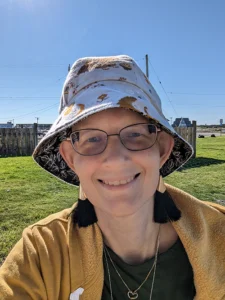 The American Cancer Society uses the term “survivor” to refer to anyone who has been diagnosed with cancer, no matter where they are in the course of the disease. Being a breast cancer survivor has opened my eyes to how much stigma still exists and how often people do not know how best to offer support. Using insensitive language around a person with breast cancer can impact their mental and physical health. What you say and how you say it really matters.
The American Cancer Society uses the term “survivor” to refer to anyone who has been diagnosed with cancer, no matter where they are in the course of the disease. Being a breast cancer survivor has opened my eyes to how much stigma still exists and how often people do not know how best to offer support. Using insensitive language around a person with breast cancer can impact their mental and physical health. What you say and how you say it really matters.
According to the American Cancer Society, 1 in 8 women will be diagnosed with breast cancer, and the Centers for Disease Control reports that 1 in 100 men will be diagnosed. Given this, chances are you will find yourself in a position to offer support to a survivor.
I asked survivors in several groups I’m part of to share things they wish they had heard (or not heard) while facing cancer. Close to 100 people responded, and five main recommendations emerged.
- Avoid battle language, like “fight,” “war” and “win.”
While these phrases may be viewed as empowering to some, many survivors find them problematic. In breast cancer there are no winners or losers. The notion of a battle implies that those who died from breast cancer didn’t fight as hard as the survivors who did.
Furthermore, battle language implies that we are in control, that if we just fight hard enough, we can cure ourselves. Battle language also implies a choice to enter the battle. None of us chose this. We were thrust into it and are doing our best to get through it.
Consider: Person-first language, such as “a person living with and beyond cancer.”
- Avoid silver-lining language, like “At least they caught it early,” “It’s just hair,” or “It’s just breast cancer — that’s the good cancer to have.”
These phrases imply that things could be worse and we should be grateful they aren’t worse.
This minimizes the pain, trauma, fear and grief of cancer and treatment. Cancer is trying to kill us — that is terrifying. To survive, we are forced to undergo surgery and make impossible decisions about our bodies. Breast cancer impacts many of the things we associate with womanhood, and those losses and changes to our physical appearance create trauma to our body and psyche.
Consider: “I know you are being forced to make a lot of difficult decisions about your treatment. I am here if you want to talk about it or need someone to listen.
- Avoid language that puts the survivor on a pedestal, such as “You are so strong,” “I admire you” or “You inspire me.”
This separates the survivor from those around them, reminding the survivor they are different. It also forces the survivor to put on a brave face instead of feeling like they can talk about their struggles. We have no choice but to go through difficult and painful treatments if we want to survive. We often don’t feel strong. Cancer by its very nature makes us feel weak and vulnerable. We don’t want to pretend we are OK, because we aren’t. We just want someone to sit with us in the mud and the muck, to be present with us in uncomfortable places.
Consider: “How are you really doing with everything?” “I’m sorry this is happening to you. It’s going to be a tough journey, but I am here for you,” or even “This really sucks.”
- Avoid vague offers to help, like “Let me know if you need anything,” “How can I help?” or “Tell me what you need.”
Survivors don’t know what they need because they have never been in this situation before. They don’t want to need help, and they feel awkward asking for help. By asking how you can help, the burden is put on our shoulders to decide what we need and communicate it to you.
Think about what you can do, and offer it. What resources and capacity do you have to help? What would you want if you were in our situation? Actions speak louder than words. What practical help can you offer?
Consider: “I want to buy you dinner. What restaurants are near you?” “Can I send you texts just to check in periodically?” “I’m going shopping. Anything specific I can grab for you?” “Let’s have lunch and forget about all of this for a few minutes.” “I know you have treatment on Mondays. I’m going to drop off a meal. What tastes good to you?” “I’m here to listen, but if you would rather not, here is a journal you can write it all down in.”
- Avoid assuming religion with phrases like “I’ll pray for you” or “You’re in my prayers.”
Know your audience. Just because you find strength in your faith doesn’t mean that someone else does. Don’t assume — ask and then be OK with the answer you are given.
Consider: “I would like to pray for you. Would you be OK with that?” It’s OK if you don’t know what to say. Sometimes it’s enough to say, “I don’t know what to say, but I am here to listen.”
Above all, survivors are allowed to define their experience however they see fit and use whatever language they identify with. While I’ve offered general recommendations here, it is always best to ask the survivor how they feel about certain words and phrases.



